 |
|
|
||||||||||||||||||||||||||||
|
AA & Pgymy Curent Meter Accessories
The AquaCalc 5000 is a handheld display that measures, records and calculates velocity and total flow measurements from AA and Pygmy current meters. The user inputs the distance and depth, while the AquaCalc measures the revolutions and elapsed time, thus calculating the mean velocity and total stream discharge. It stores 9 complete cross sections, with 99 vertical measurements for each cross section. After the stream measurements are complete, you can upload the data to a PC. Advantages include; more efficient stream flow calculations; reduces operator error by automatically computing formulas and eliminating transcription errors; ability to add or delete a station anywhere in the cross section, and measure up to 5-points in a vertical (Surface, 0.2, 0.6, 0.8, Bottom). The AquaCalc is manufactured from high-quality water resistant materials to withstand prolonged exposure to sunlight, rain, sleet and snow, and an optional rod mount is available to attach the indicator to a top-setting wading rod.
The AquaCount can be used with no modification or retrofit of a standard AA or Pygmy current meter. Just plug it into the same connector you have for your headphone and immediately start reading velocity, revolutions and time. The AquaCount can be used with wading rods or cable suspended systems. It uses the same advanced CMOS circuitry as the AquaCalc 5000 which has proven itself in the USGS to be the accepted standard. With sealed membrane buttons and water resistant sealed circuitry, the AquaCount's easy to read 32 character LCD displays reading to four significant figures, and it is powered by a 9 VDC battery with power conserving standby circuitry for long battery life.
AquaPulse - Impulse Counter-Timer
The Top Setting Wading Rod is intended for use with the AA and Pygmy current meters. It is designed for measuring shallow streams, with the standard metric rod marked in centimeter increments with a length of 1.2 meters. The standard English rod is marked in feet and tenths with a length of 4 feet. These wading rods also are available in lengths up to 3 meters or 10 feet. The anodized aluminum handle has an integral scale to indicate the correct setting of the current meter at the 0.2, 0.6 and 0.8- depth settings. It allows the hydrologist to quickly set the meter at the correct depth without bringing the meter out of the water. The depth of the water is read on the graduated hex main rod. When the round setting rod is adjusted to the depth of the water, the current meter is automatically positioned for the 0.6-depth method (0.4-depth position up from the streambed). Setting the unit to half the water depth will place the meter at the 0.2-depth up from the streambed. Conversely, setting the unit to twice the water depth will place the meter at the 0.8-depth position up from the streambed. The latter two positions correspond to the conventional two-position method. A phono jack on top of the handle will fit the connector from headphones, the AquaPulse, AquaCount or AquaCalc (Pro). All parts are made of stainless steel, anodized aluminium and brass. The A-55 Sounding Reel is used to position stream gauging and sample collection equipment from an overhead structure or boat. The reel is used with weights up to 45 kg (100 pounds) and holds 23 meters of 0.25 cm diameter Ellsworth sounding cable. The reel can be mounted on Type A and Type E cranes, the bridgeboard, the sit-down or stand-up cable car, and a boat boom assembly. The A-55 reel is equipped with a USGS-type computing depth indicator and can be furnished to read in either Metric or English units. The computing depth indicator has a main dial graduated in meters or feet, and decimeters or tenths of a foot. The numbered inner dial shows total depth and the main dial has a graduated spiral to indicate directly the 0.8 depth position. The Canadian model comes with a 4-digit counter that displays the depth digitally in centimeters. Each reel is equipped with removable handle, steel carrying case and pressed sleeve connector (the Type B connector can be specified if required).
The A-Pack Reel is small and compact and was designed for use at remote sites where it is necessary for the hydrologist to backpack or hand carry the stream gauging equipment for some distance. It is for use with weights up to 23 kg (50 pounds). The drum has 13.7m of 0.25 cm Ellsworth sounding cable. The reel is equipped with a removable handle, steel carrying case and is equipped with a counter to measure water depth in Metric or English units. The Type A Sounding Reel has the same design specifications as the A-55 but uses the same counter as the A-Pack reel. This allows for a higher capacity reel than the A-Pack with a simpler, lower cost counter than the A-55 reel. The Type A reel counter can be specified to read in either Metric or English units.
The Bridgeboard is designed for making discharge measurements and obtaining water quality samples from bridges. It is a free-standing support, accommodating Type A-55, A-Pack, Type A or B-56 sounding reels. It comes with an adjustable foot rest which makes it easily adaptable to bridge railings of different heights and walkways of various widths. The suspension cable is stretched out over the sheave at the end of the 4 foot long boom and the current meter or sampler is then suspended from the cable and lowered into the water. A roller kit and boat mount are available for the bridgeboard. The recommended maximum sounding weight to be used with the bridge board is 50 pounds (23 kg).
The handline consists of a Lee-Au handline reel, 40 feet (12.2 m.) of 0.10-inch (0.25 cm) Ellsworth cable, a pressed sleeve connector, and a 10 foot (3 m), 16-gauge/2-conductor, rubber-covered electrical cord with adapter to complete the electrical circuit from the current meter to the headphone, counter or beeper. Additional electrical cord lengths can be specified as required to a maximum of 65 feet.
The hanger slot is shaped to allow the hanger to tilt forward 15 degrees and backward 5 degrees from the vertical. This prevents the meter from coming into contact with, and being damaged by, the weight. These weights come in 15, 30, 50, 75, 100, 150, 200 and 300-pound (7, 14, 23, 34, 45, 68, 91 and 136 kg) sizes. The 15-pound (7 kg) weight is cast from brass, but all others are cast from lead and have aluminum tailfins. All are properly balanced and tested by an approved method before shipment. The weights can be epoxy coated if required. Required weight can be estimated by the following formula: |
||||||||||||||||||||||||||||
|
Copyright
© 2001 Geo Scientific Inc., All Rights Reserved |
||||||||||||||||||||||||||||

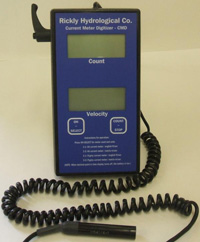 The AquaCount provides a digital readout for
The AquaCount provides a digital readout for 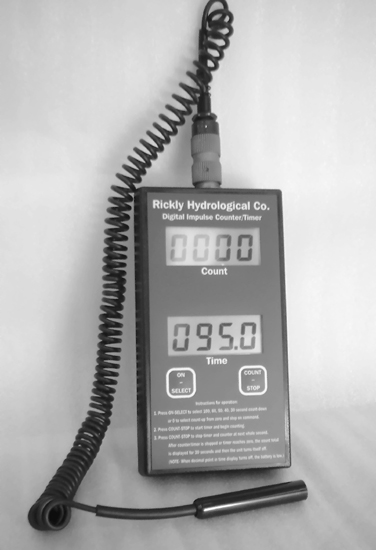

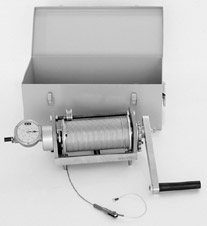
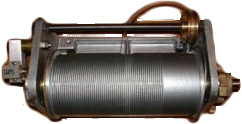
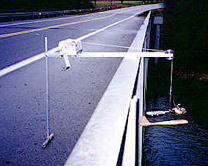
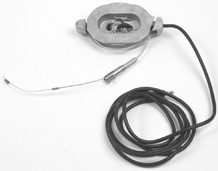 The handline is used to make discharge measurements or to collect water quality or sediment samples where it is inconvenient to use a sounding reel or crane. It can be suspended from boat, bridge, irrigation channel, walkway or other platform. It does not have a counter to measure water depth, and only 15 or 30-pound (7 or 14 kg) sounding weights should be used with it.
The handline is used to make discharge measurements or to collect water quality or sediment samples where it is inconvenient to use a sounding reel or crane. It can be suspended from boat, bridge, irrigation channel, walkway or other platform. It does not have a counter to measure water depth, and only 15 or 30-pound (7 or 14 kg) sounding weights should be used with it. 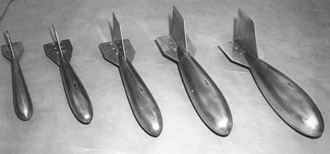 Sounding weights are used in streams where discharge measurements are made by suspension techniques from bridges, cableways or boats. The sounding weight is suspended below the current meter to keep it stationary in the water. The USGS Columbus-type or "C"-type weights are streamlined to minimize resistance to flowing water and are longer than the current meter, thereby offering some protection from bridge piers and flowing debris. The added length also produces better directional and stabilizing characteristics than that obtained with other weights.
Sounding weights are used in streams where discharge measurements are made by suspension techniques from bridges, cableways or boats. The sounding weight is suspended below the current meter to keep it stationary in the water. The USGS Columbus-type or "C"-type weights are streamlined to minimize resistance to flowing water and are longer than the current meter, thereby offering some protection from bridge piers and flowing debris. The added length also produces better directional and stabilizing characteristics than that obtained with other weights.